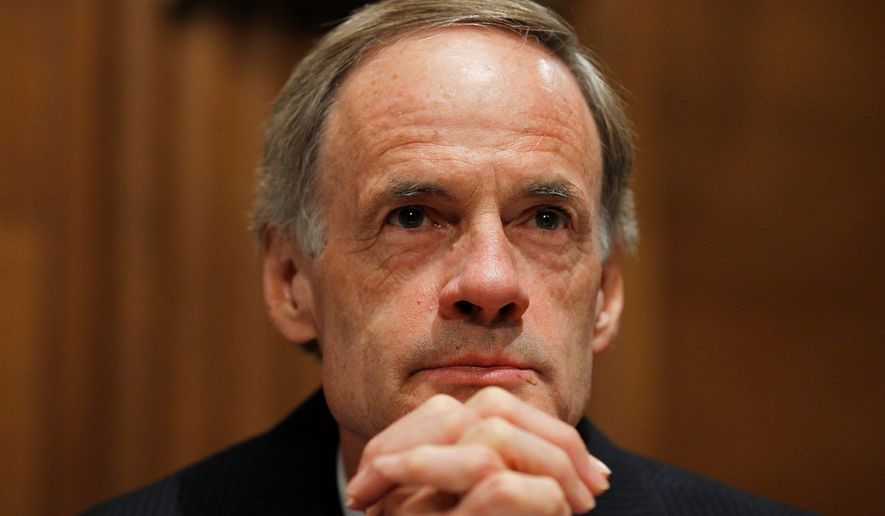A Democratic senator held the first congressional hearing on D.C. statehood in 20 years to “restart the conversation” about the city’s lack of voting representation on Capitol Hill, but the discussion barely got off the ground before a top Republican quickly dismissed the summit as a one-sided look at a measure that’s going nowhere.
“Little effort was made to hold a hearing that seriously debates this bill,” Sen. Tom Coburn, Oklahoma Republican, said after Sen. Thomas R. Carper of Delaware kicked off his hearing before the Homeland Security and Government Affairs Committee.
The “New Columbia Admission Act” would reduce the federal District of Columbia to an enclave that includes the National Mall and White House while the remainder of the city would become the country’s 51st state.
Denizens of the nation’s capital have long fought for statehood or at least some form of meaningful representation in Congress, noting they pay federal taxes and fight in wars on America’s behalf.
Mr. Carper said it is important for the latest generation to understand that residents of the nation’s capital have no vote in Congress, so he offered his bill as a stage for testimony from the District’s top leaders and scholars on either side of the issue.
But Mr. Coburn, the top Republican on the committee, threw cold water on the notion that D.C. residents will enjoy statehood anytime soon.
SEE ALSO: D.C. resumes push for statehood
He said the hearing could not be taken seriously, citing a lack of federal-agency testimony and dissenting views. And, he said, significant constitutional questions would not be answered.
“Who’s here to represent Virginia and Maryland?” he said, noting Maryland ceded land to form the capital centuries ago.
He also said the capital was designed to be neutral territory, and that several federal agencies should have been called before Congress to describe how D.C. statehood would affect their operations.
Forging ahead on his own, Mr. Carper welcomed Delegate Eleanor Holmes Norton, the city’s non-voting member of Congress, D.C. Mayor Vincent C. Gray and Council Chairman Phil Mendelson to testify on his statehood bill.
Each of the officials are Democrats, as are the vast majority of voters in the city. And it is no secret that Republicans will resist any effort to add a pair of senators and a House representative that will surely be a member of the opposing party.
But Mr. Carper said the conversation about D.C. representation is worthwhile. The city’s residents pay federal taxes and number more than 630,000, he noted.
“More than both Wyoming and Vermont,” he said.
Mr. Gray, a one-term mayor who lost the Democratic primary earlier this year, was scheduled to testify about the sacrifices his constituents make with no voice in Congress.
“The District of Columbia is the only place in the United States of America where Americans serve in the military, fight and die in wars, serve on juries and are taxed, without voting representation in either house of Congress,” he said in written testimony. “That is wrong.”
Mr. Gray said foreigners are “astounded” when they learn D.C. residents do not enjoy voting rights in Congress.
He also said the city is prospering and far beyond its woeful state in the 1990s, when a congressionally mandated control board took control of its finances.
Alice Rivlin, chairwoman of that control board, condemned the District’s lack of voting rights as an”anomaly and an anachronism.”
Roger Pilon, a vice president at the libertarian Cato Institute, offered the lone dissenting view among the experts. He said the statehood bill would be both unconstitutional and “impractical,” allowing the District to exert undue influence over the federal enclave it would surround and stripping Congress of its constitutional oversight of the capital.
Over the past two decades, politicians have introduced legislation multiple times that would grant statehood to the District and congressional representation to the city’s residents. Previous attempts have died in committee, and the last time such a bill got a public airing on Capitol Hill was in 1993.
⦁ Andrea Noble contributed to this report.
• Tom Howell Jr. can be reached at thowell@washingtontimes.com.




Please read our comment policy before commenting.